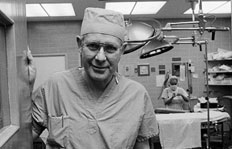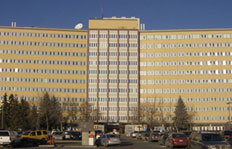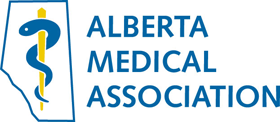Dr. Peter Cruse, 1927-2006

Dr. Peter Cruse's wound infection surveillance program at Calgary's Foothills Hospital dramatically decreased the infection rate among hospital patients.
He had a keen interest in medical history and founded the undergraduate medical history course at the U of C. This course eventually extended to all Canadian faculties of medicine through the History of Medicine Days.
Seek out that which is noble in our past and make it a living ideal in our lives. (Alberta Medical Foundation motto written by Dr. Cruse)
Born in South Africa, Dr. Cruse graduated from the University of Cape Town and interned at Durban McCord Zulu Hospital.
Research and practice in Calgary
After earning his British Fellowship in Surgery, he decided to move his family to Calgary. A Canadian FRCSC followed. He transferred his surgical practice to Calgary’s Foothills Hospital when it opened in 1966.
Soon immersed in the life of the Foothills, he became the President of the Medical Staff and initiated the first medical staff ball, helped start the first Stampede breakfast. (He also designed the hospital tie.)
Founding the wound infection surveillance program
In 1967, he began the wound infection surveillance program for which he became world famous. Dr. Cruse found that several factors affected the wound infection rate among hospital patients:
- The longer the patient was in hospital, the higher the wound infection rate.
- Gentle technique was more important than antibiotic drugs in reducing the rate.
- 22% of infections occurred after discharge.
- Showering twice before surgery with Hexachlorophene halved the rate.
- Surgical site shaving was best avoided.
- Malnutrition, obesity and diabetes all increased the rate.
By 1977, Dr. Cruse’s methods had brought the Foothills’ clean post-operative infection rate down to an impressive 0.6%, from 3-5%.
Work with trauma
In 1968, he began the annual Foothills Trauma symposium, which continued until 1975.
His first prominent trauma case saved the life of an oil worker impaled on a bridge railing. The patient recovered so quickly he was still able to get married on his planned wedding date a month later.
Dr Cruse served as Professor and Head of Surgery at the University of Calgary from 1981 to 1988.
Charting the history of medicine
Dr. Cruse began a history of medicine course for surgical clinical clerks in 1972, extended it to all MD students in 1978 and then to all Canadian faculties of medicine through the annual History of Medicine Days, which started in 1991.
He was awarded the Neilson Canadian Historian of the Year award in 1989. His reputation facilitated the funding of a chair in the History of Medicine at the U of C in 1995.
